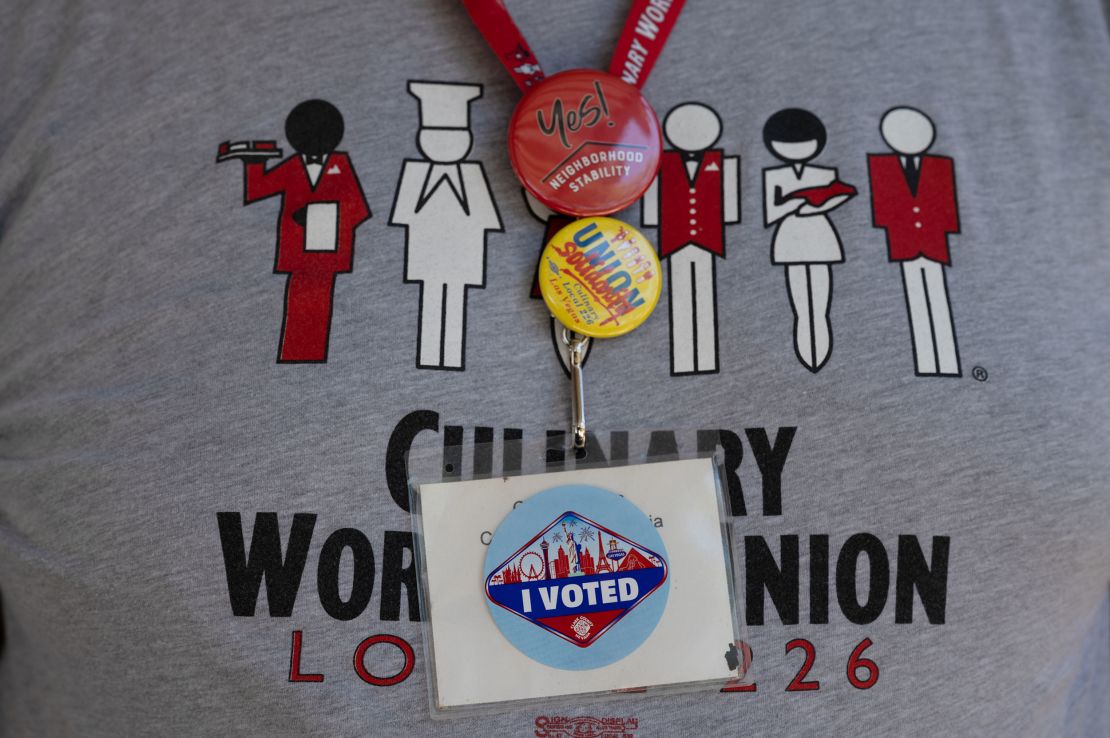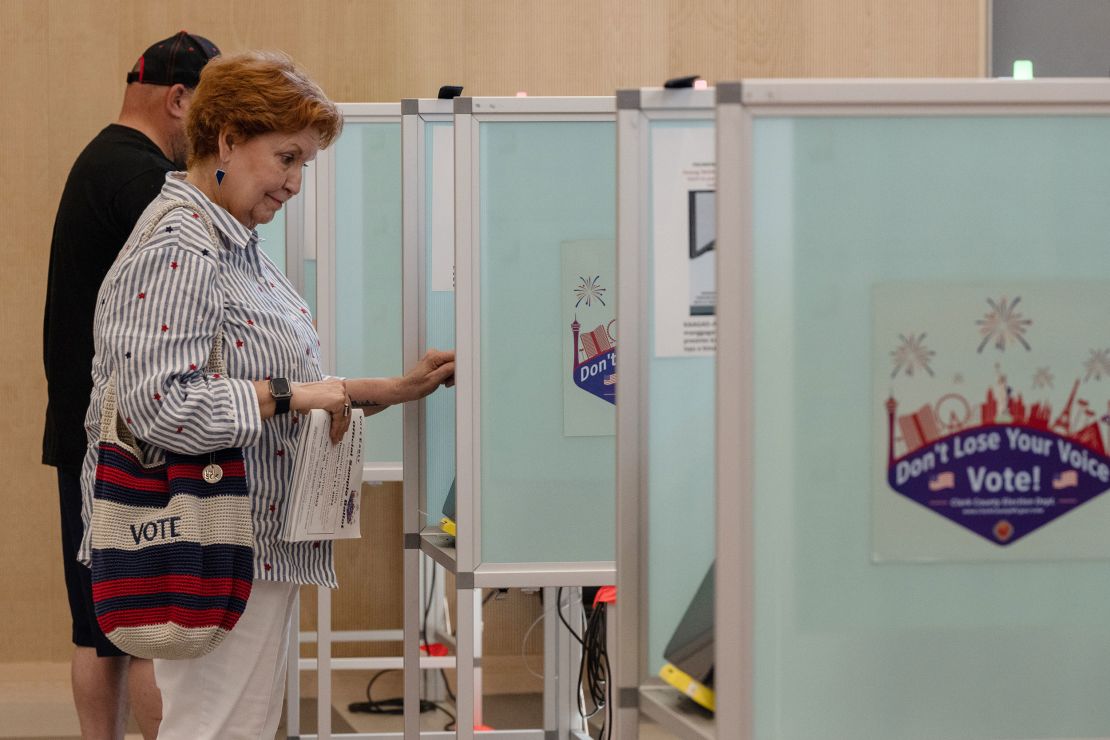Victor Villanueva’s Chicago White Sox hat was stained with sweat by the end of a recent door-knocking session in East Las Vegas, a manifestation of the time he had spent urging mostly Latino voters here in Clark County to cast ballots in 2022.
But with prices rising for everything from gas to food to rent, Villanueva’s job with Somos Votantes, a political organization founded in 2019 looking to boost Latino turnout in Nevada and across the country, is as much sounding board for the pain people are feeling as it is organizer.
“They are telling me that they are struggling,” Villanueva said, reflecting on a string of conversations he’d had during an early June canvassing session in a majority Latino neighborhood in East Las Vegas. Within minutes of Villanueva knocking on a door, most conversations turned to cost – with voter after voter lamenting that their money just isn’t going as far as it once did.
The economic anxiety he hears daily represents an existential problem for Nevada Democrats. Led by the late Sen. Harry Reid, Nevada Democrats have spent years turning the once red state into a place difficult for Republicans to win. Democrats control the governor’s mansion, the state legislature, three out of four congressional seats and both US Senate seats – and a significant reason for that success was the party’s dominance among Latino voters.

But the party’s strength with Latinos is now unsettled. As has been the case across the country to varying degrees, Latino voters gravitated toward Republicans during former President Donald Trump’s tenure.
And with voters feeling the pain of rising prices, they may take out their frustration on the party in power. And that punishment could be dramatic in Nevada, with two high-profile statewide races – Gov. Steve Sisolak and Sen. Catherine Cortez Masto are running for reelection – and two competitive House seats in Southern Nevada.
“Anything now is so expensive,” Isaura Gonzalez, a 41-year-old who works at a casino in Las Vegas, told Villanueva as they chatted on her doorstep. “You go to the store before, you spend for one, maybe for two weeks, with $150, now you go to the store and you buy only a couple stuff for maybe today and tomorrow. And that’s $150 already.”

Gonzalez’s reflections are far from unique, Villanueva said.
“That’s a very, very common theme,” said Villanueva, who is often struck by how personal people are willing to get with someone at their door. “It’s not something that normally gets talked about out in the open, especially with somebody who is a stranger. … If they’re actually coming out and wanting to talk about it, then it’s an issue.”
Gonzalez told CNN that she and many others in her neighborhood traditionally back Democrats – in 2020, she was close to not voting at all, she said – but that she has seen friends change party affiliation over the recent pain.
“Many people, they changed (parties) or they aren’t voting because they know they never change things,” she said. “Maybe I need to look at the position, and maybe I change my voting for other parties.”
‘Acknowledging people’s economic pain points’

At one door, Henry Palacios, a 26-year-old waiter, told Villanueva about how increased rents have meant U-Haul after U-Haul truck moving people out of his apartment complex. At another door, Margoth de Leon, a 67-year-old woman, described in Spanish how putting food on the table has been impacted by recent price increases. Down the block, Hermelinda Gamboa explained to the political canvasser how increases in the cost of her diabetes medicine – the medication for her husband and herself costs more than $1,000 a month – has forced her to ask her daughter for money.
To Melissa Morales, founder of Somos Votantes, these kinds of conversations are at the forefront of understanding how people are feeling and responding with both solutions and targeted political messaging.
At every house Somos Votantes visits, the organizer asks the resident if they will film a short video or allow the group to take a photo and describe what is impacting their lives. While the ensuing videos and photos will be used in digital advertising, they also serve as a sort of journal of what voters are worried about.
The effort has highlighted just how much pain rising prices are inflicting.

“It’s a real thing,” Morales said. “And if we don’t acknowledge what’s happening, we sound crazy, right? We sound out of touch, and it doesn’t help anybody. Our whole message starts with acknowledging people’s economic pain points right now.”
Somos Votantes is making Nevada the focal point of its campaign, planning to spend half of its national budget on the state.
And the group is far from alone in focusing its organizing power on turning out Latino voters in Nevada.
The state’s Culinary Union has been organizing ahead of the midterm elections since May, sending some of its nearly 60,000 members to doors across the city as its advocates for a ballot measure that would prevent rent from increasing by more than the cost of living. The union has long represented the heart of Latino organizing in the city, with 54% of its members identifying as Latino.

Just like Villanueva, Culinary Union organizers Carlos Padilla and Mirtha Rojas regularly hear concerns about rising prices in Clark County.
“It’s the biggest issue for anybody,” Padilla said as he knocked on doors in a sprawling apartment complex a few miles from the Strip, adding that he hears these concerns at “almost every door.”
To Padilla, a 29-year member of the Culinary Union who works at Treasure Island, the GOP is to blame – “It’s the Republicans that are blocking anything that the Democrats are trying to do,” he said – but he acknowledged that “people were just fed up” in 2020 and turned to Trump in order to throw out the entire system.
Still, this isn’t the first time Democrats have worried about losing Latino voters in Nevada. Months into the coronavirus pandemic, and just weeks before the 2020 election, Biden’s Nevada team was deeply worried that its modeling was showing Latino men being won over by Trump’s messaging, according to a source familiar with campaign’s inner workings.
Will McCurdy II, chair of the Nevada Democratic Party in 2020 and now a member of the Clark County Commission, acknowledged that concern.

“When we do see slides and we do see changes in voter behavior, it obviously makes us want to take a step back and reflect on the messaging and why that is happening,” he said. “We just need to make sure that we continue our strong messaging around the economy.”
In the end, while Biden eked out a victory in Nevada, Trump grew his share of Latino voters, winning 35% of that electorate in 2020 after winning 29% in 2016.
‘The slide won’t continue’
The economic pain Nevada voters feel right now cannot be separated from the pandemic.
Nevada – and especially tourist-dependent Clark County, home to Las Vegas – was hit particularly hard by the coronavirus and the subsequent economic upheaval. In April 2020, in the early days of the pandemic and with casinos, restaurants and other places in the city closed to slow the spread of the virus, unemployment in the county topped 30%. While that rate fell dramatically in the subsequent months, restrictions on gathering and a lack of interest in holding the major conventions that fuel part of Southern Nevada continued to impact the economy for months. A study by the business website Yelp found Las Vegas among the top locations for permanent business closures due to the pandemic.
Democrats contend the state is bouncing back better than others – noting a falling unemployment rate and private-sector employment that has already surpassed its pre-pandemic high – but the way the pandemic impacted Nevada ahead of the 2020 election gave Trump an opening in the state.
“A lot of people got taken by the lies of Trump, by the power and the things he portrayed that were really a mirage,” said Adela Galvan, an East Las Vegas resident who was attending a recent Sisolak event.

Republicans in the state are looking to use that opening. Many in the party, from gubernatorial candidate and former Clark County Sherriff Joe Lombardo to former Nevada Attorney General and Senate candidate Adam Laxalt, are running against the steps Democrats took during the pandemic, at times specifically noting the impact it had on business in the Latino community. And the cost of living has become a focal point, too.
“Nevada’s Latino community faces massive inflation, sky-high gas prices and rising costs for even the most basic goods,” Laxalt said in a statement this week, accusing Cortez Masto of doing “nothing” about the issue. “She’s taken their votes for granted while delivering nothing but empty promises.”
Democrats are keenly aware of the issues that rising prices present the party, especially among Latino voters.
“You can’t win elections without the Latino vote in Nevada,” said Cecia Alvarado, Nevada executive director of Somos Votantes.

In a sign of how rising costs will be central in that fight, Josh Marcus-Blank, spokesman for the Cortez Masto campaign, responded to Laxalt by saying the senator “is leading efforts in the Senate to lower costs for Nevada families and hold Big Oil companies accountable for rising prices,” before accusing Laxalt of having ties to oil companies that are raising prices on consumers. Cortez Masto, the granddaughter of a Mexican immigrant, was the first Latina ever to be elected to the Senate.
It was also readily apparent that Sisolak understands this importance of these issues when he opted to vote for himself ahead of the June 14 primary at an early voting location in East Las Vegas, the heart of Clark County’s Latino community.
Flanked by members of his Latino Advisory Council, Sisolak backed his lieutenant governor, Lisa Cano Burkhead, for reelection. Buckhead, a first-generation Latina American, mingled with event attendees, seamlessly bouncing from English to Spanish and back to English.

In an interview with CNN after he voted, Sisolak acknowledged the pain people are feeling – “Everybody’s facing the issue, whether it’s prices at the pump, prices at the grocery store. It’s real. It’s not something that’s imagined,” he said – but he added there is little that he, at the state level, can do about inflation.
“There’s not a lot you can do at the state level to impact the inflation rate,” he said, instead noting that his administration has tried to address the money people have by raising wages.
When asked about whether Latinos will continue to slide toward Republicans in 2020, the governor replied, “The slide won’t continue,” he said. “We can continue the years of dominance.”

